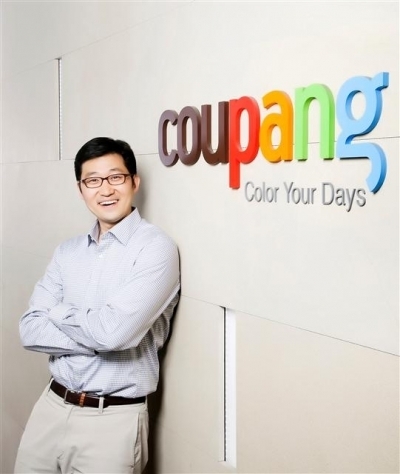South Korea’s top e-commerce operator Coupang is expected to have logged a record-high loss in 2015, according to Coupang and industry analysts, fueling partial concerns over its aggressive spending.
A recent report by Hana Investment Securities forecast that Coupang would log an operating loss of about 400 billion won ($320 million) for 2015, up by 299 percent from a loss of 121.5 billion in 2014.
Though its sales are expected to have hiked by more than 400 percent last year from 348.5 billion won in 2014, heavy investment into its delivery and logistics service have reportedly led to piling losses.
Coupang confirmed the deficit on Tuesday, noting that “the losses in question were expected and in line with its larger business agenda.” It will release more detailed figures in its regulatory filing in April.
 |
Coupang CEO Kim Bom |
Despite mounting losses, the company is pushing for a plan to further inject 1.5 trillion won into increasing the number of its delivery personnel and logistics centers nationwide by 2017, continuing the move that began in 2014.
Six years into its launch, Coupang is perceived as a success case in Korea’s tech start-up industry, growing from a small “daily deal” start-up into the country’s leading go-to source for bargain deals.
Marking the country’s largest-ever Internet investment, Coupang secured $1 billion from SoftBank Corp. in June of last year. In 2014, it had attracted $100 million from Sequoia Capital and $300 million from Blackrock.
The Japanese investor reportedly saw high potential in Coupang’s exclusive “Rocket Delivery” system -- free delivery within 24 hours by Coupang’s own deliverymen for purchases over 9,800 won.
Determined to remain ahead of its competitors and attract further users, Coupang is set on continuing to expand its touted delivery service and infrastructure — a centerpiece of the e-commerce operator’s current success.
It has vowed to continue offering customers goods at the lowest retail price possible, though it is increasingly being challenged by competing online and offline retailers which have also put forward similarly low prices today.
Despite its achievements and visible market leadership, some analysts have raised concern that Coupang’s exorbitant spending in scaling up its exclusive “Rocket Delivery” service and logistics system may be difficult to sustain in the long run.
Coupang’s losses are higher than expected,” said Hana Financial Securities analyst Park Jong-dae in the report. “It’s running out of capital at a quick pace,” citing that the firm has likely already used up more than half of the $1 billion injected by Softbank last year.
Further concerns were raised last month when a local news outlet reported that Coupang planned to sell off two of its prized logistics centers in an attempt to secure new funds. The firm has officially denied the claims.
“All speculations that question the company’s financial stability or liquidity are baseless,” a Coupang spokesperson told The Korea Herald. “This will become evident after we submit our regulatory filing in April.”
Given the volume of the investments Coupang has secured thus far (about 1.7 trillion won in total), the current loss rate entirely manageable, the official explained.
Meanwhile, Coupang CEO Kim Bom is determined to build up his company as Korea’s undisputed No. 1 e-commerce operator at all costs.
Citing cases like Amazon and Alibaba, which also posted losses in the beginning stages of their business, Kim said in a recent media interview that the preliminary losses are simply a “part of tracking toward its end goal,” expressing confidence in its projected returns.
Yet, critics point out that Coupang’s calculations may not pan out as planned, given competing e-commerce operators and mega local retailers, including Shinsegae Group's E-mart, are bent on containing Coupang’s success.
E-mart recently announced that it would offer customers “the lowest prices among all retailers” in Korea, starting with diapers and powdered baby formula, which are also Coupang’s best-selling products.
Coupang, which took up just 5.4 percent of the local e-commerce market in 2015, must “secure a significantly larger portion of the market in order to overturn its losses when the market’s overall scale increases in the future,” Park said.
Amazon reportedly dominates about 35 percent of today’s U.S. e-commerce market while Alibaba dominates about 80 percent of its respective market in China.
By Sohn Ji-young (
jys@heraldcorp.com)







![[Today’s K-pop] Blackpink’s Jennie, Lisa invited to Coachella as solo acts](http://res.heraldm.com/phpwas/restmb_idxmake.php?idx=644&simg=/content/image/2024/11/21/20241121050099_0.jpg)
